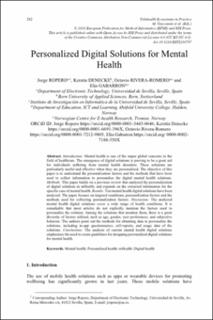| dc.contributor.author | Ropero, Jorge | |
| dc.contributor.author | Denecke, Kerstin | |
| dc.contributor.author | Rivera-Romero, Octavio | |
| dc.contributor.author | Gabarron, Elia | |
| dc.date.accessioned | 2024-04-05T11:38:02Z | |
| dc.date.available | 2024-04-05T11:38:02Z | |
| dc.date.created | 2023-10-24T12:36:39Z | |
| dc.date.issued | 2023 | |
| dc.identifier.citation | Studies in Health Technology and Informatics. 2023, 309, 282-286. | en_US |
| dc.identifier.issn | 0926-9630 | |
| dc.identifier.uri | https://hdl.handle.net/11250/3125087 | |
| dc.description.abstract | Introduction: Mental health is one of the major global concerns in the field of healthcare. The emergence of digital solutions is proving to be a great aid for individuals suffering from mental health disorders. These solutions are particularly useful and effective when they are personalized. The objective of this paper is to understand the personalization factors and the methods that have been used to collect information to personalize the digital mental health solutions. Methods: This paper builds on a previous review that analyzed the personalization of digital solutions in mHealth, and expands on the extracted information for the specific case of mental health. Results: Ten mental health digital solutions have been analyzed. The paper focuses on targeted conditions, personalization factors and the methods used for collecting personalization factors. Discussion: The analyzed mental health digital solutions cover a wide range of health conditions. It is remarkable that most articles do not explicitly mention the factors used to personalize the solution. Among the solutions that mention them, there is a great diversity of factors utilized, such as age, gender, user preferences, and subjective behavior. The authors point out the methods for obtaining data to personalize the solutions, including in-app questionnaires, self-reports, and usage data of the solutions. Conclusions: The analysis of current mental health digital solutions emphasizes the need to create guidelines for designing personalized digital solutions for mental health. | en_US |
| dc.language.iso | eng | en_US |
| dc.publisher | IOS Press | en_US |
| dc.rights | Navngivelse-Ikkekommersiell 4.0 Internasjonal | * |
| dc.rights.uri | http://creativecommons.org/licenses/by-nc/4.0/deed.no | * |
| dc.subject | mental health | en_US |
| dc.subject | personalized health | en_US |
| dc.subject | mHealth | en_US |
| dc.subject | digital health | en_US |
| dc.title | Personalized Digital Solutions for Mental Health | en_US |
| dc.type | Peer reviewed | en_US |
| dc.type | Journal article | en_US |
| dc.description.version | publishedVersion | en_US |
| dc.rights.holder | © 2023 European Federation for Medical Informatics (EFMI) and IOS Press. | en_US |
| dc.subject.nsi | VDP::Medisinske Fag: 700::Klinisk medisinske fag: 750::Psykiatri, barnepsykiatri: 757 | en_US |
| dc.subject.nsi | VDP::Teknologi: 500::Informasjons- og kommunikasjonsteknologi: 550 | en_US |
| dc.source.pagenumber | 282-286 | en_US |
| dc.source.volume | 309 | en_US |
| dc.source.journal | Studies in Health Technology and Informatics | en_US |
| dc.identifier.doi | 10.3233/SHTI230797 | |
| dc.identifier.cristin | 2187946 | |
| cristin.ispublished | true | |
| cristin.fulltext | original | |
| cristin.qualitycode | 1 | |

